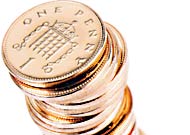Don't lose out when you change your holiday money
A little thought before you travel can save you from wasting a lot of cash, says Helen Monks

Less than three in five Brits bother to shop around for the best deal when changing their holiday money, according to new research from Moneyfacts. But not giving much consideration to your holiday spends is a surefire way to waste the money you might have saved by stumbling red-eyed to the airport for a 4 am check-in with a budget airline, or chancing having nowhere to stay by booking your bargain accommodation at the eleventh hour.
The easiest ways to lose money on your travel cash include not taking time to research your currency, assuming no-commission deals automatically mean good value, paying handling or delivery charges on currency, and using your credit and debit cards thoughtlessly while abroad.
Research from Natwest Travel Money Services shows many holidaymakers (just under 40 per cent) leave it to less than a week before their holidays to purchase foreign currency. But if you want to save money, consider taking an interest in your currency a few weeks, or even months, before going away, with a view to fixing your exchange rate at a favourable time. For example, a £200 transaction might have bought you 2,214 Rand on 10 November 2004, but only 2,082 Rand on 4 January 2005.
Some providers, such as Travelex, allow you to buy currency at a fixed price online and pick up your bundle from the airport. Many high street exchange outlets boast commission-free offers; however, don't be blinded by the zero and look at the entire package available.
This week, Travelex carried out research among high street and online foreign exchange providers offering a commission-free service. The study investigated how many euros could be purchased for £300, the average amount exchanged by a UK holidaymaker travelling to the continent. It found the cost of buying commission-free varies by more than 10 euros (£8) depending on the retailer.
Of the commission-free deals looked at, the greatest number of euros returned for £300 was €438.03; the worst returned was €427.23. The difference is usually due to the variation in the exchange rates offered by different foreign exchange providers, as well as the additional charges made for delivery of the money, if it needs to be sent to a home address, for example.
Paul Swainson, director of UK retail, Travelex, says: "Commission-free doesn't guarantee value for money, and some providers will mislead customers with what appears to be a great commission-free deal, only to include confusing conditions in the small print." If, when you come to buy your holiday money, there appears little to choose between rates, then it will be more important to look at charges.
Moneyfacts.co.uk says that providers offering commission-free travel money without handling charges include Lloyds TSB, Barclays, Bank of Scotland, Marks & Spencer, Thomas Cook, Post Office and Halifax.
Credit cards or current account debit cards are two of the most convenient ways to spend money while abroad, with both being widely accepted around the world. It might be convenient, but using your debit or credit card to pay for a paella-and-sangria fest or that life-changing swim with dolphins could cost you more than you think.
Get a free fractional share worth up to £100.
Capital at risk.
Terms and conditions apply.
ADVERTISEMENT
Get a free fractional share worth up to £100.
Capital at risk.
Terms and conditions apply.
ADVERTISEMENT
Most banks charge a foreign currency loading fee for customers using their cards abroad, typically charged at 2.75 per cent, both on cash withdrawals and retail purchases. Many banks, including Halifax, Lloyds TSB and NatWest, charge customers an extra fee for every transaction they make with their current account debit cards on retail purchases (an additional £1.50, £1 and 75p, respectively).
Nationwide is the only high street financial provider not to charge a foreign currency loading fee for customers using its cards abroad. The building society says UK cardholders spent over £20bn on credit and current account debit cards overseas in 2004, meaning over £500m was paid to card providers in foreign currency loading fees. Nationwide makes the point that with average overseas transaction values of about £75, UK consumers pay over £2 every time they buy something using their card abroad.
Withdrawing cash from ATMs also triggers extra charges, unless you bank with the likes of Nationwide. Lloyds TSB and Barclays charge an additional 1.5 per cent to a maximum of £4.50 on hole-in-the-wall withdrawals. Travelex research shows holidaymakers using cash machines will make, on average, five withdrawals per trip. To save on charges, limit the number of times you need to take out cash.
During the first 48 hours in a foreign country, more than two-thirds of travellers miscalculate on currency and waste up to £50. Taking time to familiarise yourself with the currency you are about to start spending will help you avoid overspending on your taxi from the airport, your new street map or that celebratory first-night cocktail.
Join our commenting forum
Join thought-provoking conversations, follow other Independent readers and see their replies
Comments
Bookmark popover
Removed from bookmarks